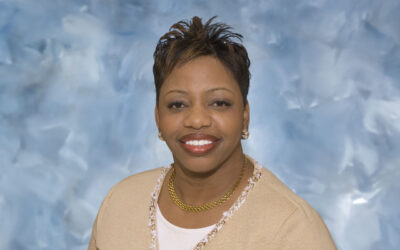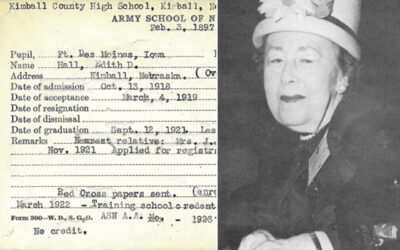By Matt Skoufalos
When Beth Ann Swan PhD, CRNP, FAAN, was headed into college, she’d planned to leverage a strong background in math and science into a career in chemical engineering.
Unfortunately, she was discouraged from those pursuits by the prevailing wisdom of the mid-1970s: women, if they studied for an advanced degree, were meant to be either teachers or nurses. She chose the latter. In doing so, what she discovered was a job with “an infinite number of opportunities.”
“I got into being a nurse by not wanting to be a nurse,” said Swan. “I always say it’s the best decision I never made.”
From such reluctant beginnings began a career that has hit some of the professional summits of its field. Starting out as a staff nurse in an urban academic health center, Swan parlayed advanced degrees into work in hospital and ambulatory care settings before she was tapped to lead a collaborative practice among nurse practitioners and anesthesiologists. She worked her way up from there to become the director of operations for 10 nurse-managed practices for underserved patients. Eventually, Swan took on international assignments before settling into her current academic role with the Jefferson College of Nursing at Thomas Jefferson University in Philadelphia, Pennsylvania.
In addition to her commitment to academics and professionalism, Swan credits mentors and supervisors in her youth with encouraging her to become involved in nursing leadership organizations. She is a past president of the American Academy of Ambulatory Care Nursing (AAACN), a role she said helped shape her thinking about the need to close the loop between hospital and offsite acute care.
“If you look in the broader context, the U.S. health care system really hasn’t kept pace with the changes in care delivery,” Swan said. “While the payment was focused on hospitals and physician providers, the care was and is delivered outside the hospital in a variety of settings.”

In the mid-1980s, care began transitioning into a variety of non-hospital settings – primary, specialty outpatient, transition, community-based – which placed much of the onus for recovery onto individuals and their families “with little consideration for if that individual and family or support person has the capacity to manage all that care outside the hospital,” Swan said.
“I believe the antidote is registered nurses who are very well versed in coordinating care and managing those transitions,” she said. “RNs must be able to lead between the hospital and post-hospital care, not just from hospital to home.”
Swan’s answer to that growing need was to co-author a core curriculum for registered nurses that would focus on care coordination and managed transitions. Evidence-based expert panels identified nine core competencies that formed the basis of what would become a new certification for CCTM: The Certified in Care Coordination and Transition Management credential (CCCTM®). This involves support for self-management, education and engagement for individuals and families, cross-setting communication and transitions, coaching and counseling of patients and families, the nursing process, teamwork and collaboration, patient-centered planning, population health management and advocacy.
Since the CCCTM credential has been offered, 674 nurses have earned it nationwide in a variety of settings. Organizations that have implemented CCTM acute care and ambulatory care settings have realized improvement in care outcomes, including in Hospital Consumer Assessment of Healthcare Providers and Systems (HCAHPS) scores.
“We see this as important for every nurse, no matter what setting they’re practicing in,” Swan said. “It’s looking at that care experience and how the communication was across providers, and how when those things are in place, that patients are perceiving being well cared for, and are perceiving quality and safe care.”
As more patients transition into managed care programs in home settings and other non-hospital environments, Swan foresees an increasing need for CCTM and similar education to manage the variety of complicated conditions they see. Having experienced so many different nursing assignments over the years has convinced her even more that training nurses to be as flexible as the circumstances in which they deliver care is the best guarantee of successful outcomes.
That said, there are career trajectories in this shifting landscape in which Swan believes “recruiting really great nurses” will always present a challenge in settings that don’t embrace continuing education. That’s why her college of nursing encourages students to participate in a spectrum of traditional and nontraditional professional experiences.
“There is always a need for nurses in the operating room,” Swan said. “Another area is going to be technology mediated, whether it’s telehealth or virtual health. You need to be able to relate to a person very quickly when you’re on the telephone or in front of a computer.”
“Places where people go for social reasons may not be traditional places where nurses are, but they’re important places for nurses to be,” she said. “We’re supporting those experiences for our students.”
More than any other skill, however, Swan believes the foremost talent of a successful nurse is a personal commitment to caring for those in need.
“Nursing is not about having a job and a paycheck,” she said. “Nursing is a personal commitment, and you really have to have a passion and compassion in order to really contribute to caring for people.”
“If you choose to become a nurse, it’s important both to have the compassion to care as well as the knowledge, the art, and the science,” Swan said. “It’s hard work; it’s rewarding work, and your commitment is really to the individuals and families that you’re caring for. Sometimes those situations can be very joyful, and sometimes those situations can be very sad, and it’s how you’re able to handle that spectrum of physical care and emotional care with compassion and understanding.”











That’s my mom!!!! You Go Girl!!! So Proud!!!!!!!
Are there any study books suggested that would help to obtain the CCCTM?